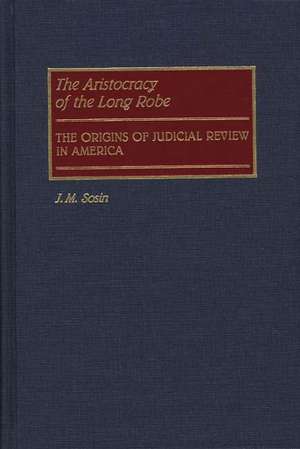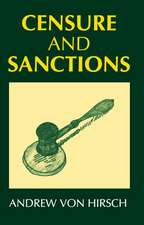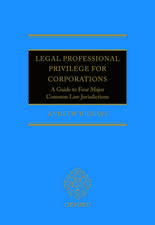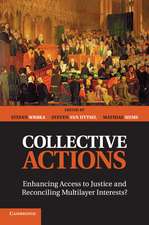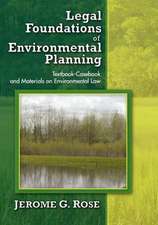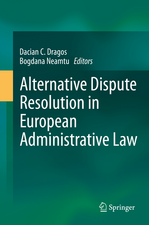The Aristocracy of the Long Robe: The Origins of Judicial Review in America: Bibliographies and Indexes in Religious Studies, cartea 52
Autor Jack M. Sosin, J. M. Sosinen Limba Engleză Hardback – 31 aug 1989
Is judicial review constitutionally required or even authorized? Can it be said whether the federal courts exercise this power with the consent of the electorate? Sosin addresses these challenging questions in the broad context of the Anglo-American historical experience. He examines the evolution of courts of judicature and legislatures and the contests for power that were waged from the seventeenth to eighteenth century.
The origins of the English court system and the establishment of common law are first described. The author traces the rise in judicial and parliamentary power that occurred with the erosion of the royal prerogative and discusses the constitutional and legal heritage that provided the framework for law, courts, and legislatures in colonial America. Following an examination of political, legislative, and legal development during the colonial period, Sosin looks at the philosophical and ideological controversies that influenced the framing of the Constitution, particulary the conflicting views of the proper relationship between the legislature and judiciary. Despite the emphatic opposition voiced by some framers to giving judges the power to overturn legislative action by ruling on the constitutionality of federal laws, the Supreme Court was able to declare itself the final arbiter and ultimate interpreter of the Constitution as early as the first decade of the nineteenth century. The author's analysis indicates that the Court's assumption of the power of judicial review was neither inevitable politically nor the logical result of the founders desire to limit government and protect the rights of individuals against interferences by public authority. Echoing early English and American political figures, Sosin asks whether this expanded, arbitrary judicial power can be considered appropriate in a representative democracy. The product of meticulous research and careful historical analysis, this provocative study will be relevant reading for a variety of courses in American government, political science, and history.
Din seria Bibliographies and Indexes in Religious Studies
-
 Preț: 325.19 lei
Preț: 325.19 lei - 42%
 Preț: 319.49 lei
Preț: 319.49 lei - 51%
 Preț: 300.38 lei
Preț: 300.38 lei - 42%
 Preț: 252.76 lei
Preț: 252.76 lei - 42%
 Preț: 322.05 lei
Preț: 322.05 lei - 26%
 Preț: 475.53 lei
Preț: 475.53 lei - 42%
 Preț: 305.61 lei
Preț: 305.61 lei - 26%
 Preț: 390.94 lei
Preț: 390.94 lei - 42%
 Preț: 250.68 lei
Preț: 250.68 lei - 51%
 Preț: 302.00 lei
Preț: 302.00 lei - 42%
 Preț: 149.80 lei
Preț: 149.80 lei - 51%
 Preț: 252.20 lei
Preț: 252.20 lei - 42%
 Preț: 325.74 lei
Preț: 325.74 lei - 50%
 Preț: 308.45 lei
Preț: 308.45 lei - 42%
 Preț: 249.73 lei
Preț: 249.73 lei - 42%
 Preț: 302.20 lei
Preț: 302.20 lei - 51%
 Preț: 305.05 lei
Preț: 305.05 lei - 50%
 Preț: 305.51 lei
Preț: 305.51 lei - 42%
 Preț: 250.86 lei
Preț: 250.86 lei - 42%
 Preț: 252.67 lei
Preț: 252.67 lei - 42%
 Preț: 321.49 lei
Preț: 321.49 lei - 42%
 Preț: 300.57 lei
Preț: 300.57 lei - 40%
 Preț: 380.47 lei
Preț: 380.47 lei - 28%
 Preț: 438.00 lei
Preț: 438.00 lei - 43%
 Preț: 369.27 lei
Preț: 369.27 lei - 51%
 Preț: 301.25 lei
Preț: 301.25 lei - 51%
 Preț: 303.90 lei
Preț: 303.90 lei - 42%
 Preț: 302.28 lei
Preț: 302.28 lei - 40%
 Preț: 336.97 lei
Preț: 336.97 lei - 52%
 Preț: 250.68 lei
Preț: 250.68 lei - 51%
 Preț: 302.59 lei
Preț: 302.59 lei - 26%
 Preț: 390.94 lei
Preț: 390.94 lei - 43%
 Preț: 169.30 lei
Preț: 169.30 lei - 51%
 Preț: 301.61 lei
Preț: 301.61 lei - 42%
 Preț: 149.80 lei
Preț: 149.80 lei - 43%
 Preț: 249.25 lei
Preț: 249.25 lei - 52%
 Preț: 251.53 lei
Preț: 251.53 lei - 43%
 Preț: 412.82 lei
Preț: 412.82 lei - 41%
 Preț: 307.51 lei
Preț: 307.51 lei - 42%
 Preț: 323.47 lei
Preț: 323.47 lei - 27%
 Preț: 350.47 lei
Preț: 350.47 lei - 24%
 Preț: 459.41 lei
Preț: 459.41 lei - 42%
 Preț: 304.66 lei
Preț: 304.66 lei - 35%
 Preț: 461.00 lei
Preț: 461.00 lei - 48%
 Preț: 268.84 lei
Preț: 268.84 lei - 38%
 Preț: 344.38 lei
Preț: 344.38 lei - 26%
 Preț: 354.30 lei
Preț: 354.30 lei - 28%
 Preț: 437.84 lei
Preț: 437.84 lei - 33%
 Preț: 321.54 lei
Preț: 321.54 lei
Preț: 441.21 lei
Preț vechi: 709.70 lei
-38% Nou
84.45€ • 87.83$ • 70.77£
Carte tipărită la comandă
Livrare economică 14-28 martie
Specificații
ISBN-10: 0313267332
Pagini: 369
Dimensiuni: 156 x 234 x 22 mm
Greutate: 0.7 kg
Ediția:New.
Editura: Greenwood Press
Seria Bibliographies and Indexes in Religious Studies
Descriere
The origins of the English court system and the establishment of common law are first described. The author traces the rise in judicial and parliamentary power that occurred with the erosion of the royal prerogative and discusses the constitutional and legal heritage that provided the framework for law, courts, and legislatures in colonial America. Following an examination of political, legislative, and legal development during the colonial period, Sosin looks at the philosophical and ideological controversies that influenced the framing of the Constitution, particulary the conflicting views of the proper relationship between the legislature and judiciary. Despite the emphatic opposition voiced by some framers to giving judges the power to overturn legislative action by ruling on the constitutionality of federal laws, the Supreme Court was able to declare itself the final arbiter and ultimate interpreter of the Constitution as early as the first decade of the nineteenth century. The author's analysis indicates that the Court's assumption of the power of judicial review was neither inevitable politically nor the logical result of the founders desire to limit government and protect the rights of individuals against interferences by public authority. Echoing early English and American political figures, Sosin asks whether this expanded, arbitrary judicial power can be considered appropriate in a representative democracy. The product of meticulous research and careful historical analysis, this provocative study will be relevant reading for a variety of courses in American government, political science, and history.
